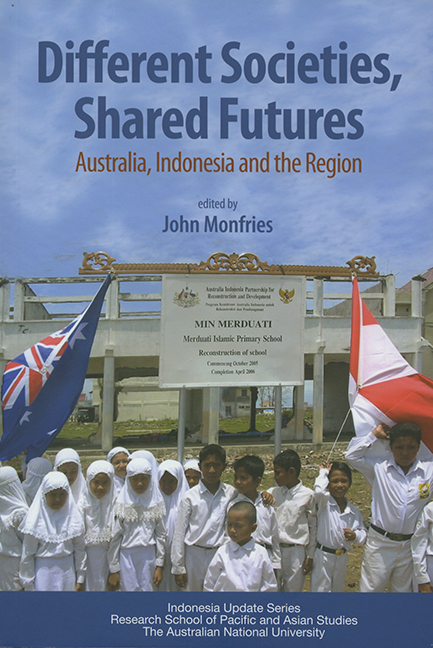Book contents
- Frontmatter
- Dedication
- Contents
- Tables
- Figures
- Contributors
- Acknowledgments
- Opening Address by Richard Woolcott AC
- 1 Introduction
- PART I Regional Viewpoints
- PART II Security Aspects
- PART III Mutual Perceptions and Irritations
- PART IV The Economic Partnership: Aid, Economics and Business
- 10 The Australia–Indonesia Partnership for Reconstruction and Development
- 11 The SBY Promise to the Business World
- 12 Australia and Indonesia in the Wider Context of Regional Economic Relations
- PART V Conclusion
- Glossary
- References
- Index
12 - Australia and Indonesia in the Wider Context of Regional Economic Relations
from PART IV - The Economic Partnership: Aid, Economics and Business
Published online by Cambridge University Press: 21 October 2015
- Frontmatter
- Dedication
- Contents
- Tables
- Figures
- Contributors
- Acknowledgments
- Opening Address by Richard Woolcott AC
- 1 Introduction
- PART I Regional Viewpoints
- PART II Security Aspects
- PART III Mutual Perceptions and Irritations
- PART IV The Economic Partnership: Aid, Economics and Business
- 10 The Australia–Indonesia Partnership for Reconstruction and Development
- 11 The SBY Promise to the Business World
- 12 Australia and Indonesia in the Wider Context of Regional Economic Relations
- PART V Conclusion
- Glossary
- References
- Index
Summary
This chapter notes the progress that is being made in regional economic cooperation, places Indonesia in this context, and examines how the relationship between Indonesia and Australia might develop to enhance both regional cooperation and, at the same time, the relationship between Australia and Indonesia.
REGIONAL RELATIONSHIPS AND GROUPINGS
Slowly but surely, more economic content (‘ballast’) is being put into regional arrangements. This process was given impetus by the Asian crisis of 1997. The original economic focus of the Association of Southeast Asian Nations (ASEAN) was largely on trade, but the crisis led to an emphasis on exchange rates and arrangements to share foreign exchange reserves through substantial currency swap arrangements. It also heightened the recognition that the multilateral international financial institutions – notably the IMF – may not always promote the interests of East Asia effectively. While the idea of a unified currency arrangement along European lines seems a very long way off, there are opportunities for integrating financial markets and achieving greater uniformity of rules and regulations. Financial markets, by their nature, are governed by complex and pervasive rules and understandings, and if capital is to move easily between these countries, there has to be greater uniformity, not only of the rules, but also of their implementation (including dispute resolution through the domestic courts). Worth noting is the launch of the two Asian Bond Funds. The first is a relatively simple fund involving the packaging of dollar-denominated debt of the participating countries (basically, all the East Asian countries that have substantive financial markets), to be held largely by central banks. The second fund is more ambitious, combining debt obligations in local currencies. While the marketability of this is still to be properly tested, one test of success has already been registered – many institutions are claiming ‘fatherhood’ of the bond fund idea: ‘success has many fathers’.
- Type
- Chapter
- Information
- Different Societies, Shared FuturesAustralia, Indonesia and the Region, pp. 156 - 168Publisher: ISEAS–Yusof Ishak InstitutePrint publication year: 2006



